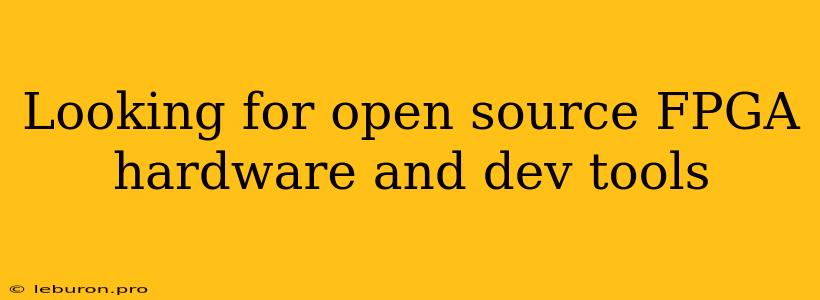The world of hardware design is constantly evolving, and with the advent of powerful and flexible Field Programmable Gate Arrays (FPGAs), the possibilities for custom hardware solutions have become incredibly vast. But navigating this world can be daunting, especially for those looking for open-source options. This article will explore the exciting landscape of open-source FPGA hardware and development tools, offering a comprehensive guide for beginners and experienced developers alike.
Why Open Source FPGA?
The appeal of open-source FPGA lies in its inherent flexibility and accessibility. Unlike traditional, proprietary hardware solutions, open-source FPGA empowers users to:
- Control the entire hardware design process: From board layout to firmware development, every stage is open and customizable, allowing for truly unique and tailored solutions.
- Collaborate and learn from a vibrant community: Open-source projects foster a collaborative spirit, enabling developers to share ideas, code, and design expertise, accelerating learning and innovation.
- Reduce cost and barriers to entry: Open-source tools and hardware often come at a lower cost than their proprietary counterparts, making FPGA design accessible to a wider range of individuals and organizations.
- Develop cutting-edge solutions: Open-source FPGA can be used to create custom hardware for various applications, including high-performance computing, embedded systems, digital signal processing, and more.
Open-Source FPGA Hardware
The hardware landscape for open-source FPGA is diverse and constantly expanding, offering a range of boards suited for various needs and budgets. Here are some popular choices:
Low-Cost Entry-Level Boards
- Terasic DE10-Nano: A highly popular board powered by the Intel Cyclone V FPGA, offering a balance of performance and affordability.
- Analog Devices AD9625-FMC-EBZ: This board is ideal for radio frequency (RF) applications, featuring an AD9625 FMC module with built-in RF transceivers.
- Lattice iCE40 HX1K Development Kit: This entry-level board offers a cost-effective way to experiment with Lattice's iCE40 FPGA family, well-suited for learning and prototyping.
High-Performance Boards for Advanced Applications
- Xilinx PYNQ-Z1: A powerful board based on the Xilinx Zynq UltraScale+ MPSoC, providing a combination of high-performance FPGA logic and powerful ARM processing cores.
- Microsemi SmartFusion2 Evaluation Kit: This board features a combination of FPGA logic and an ARM processor, making it suitable for embedded applications requiring high performance.
- Lime MicroSDR Mini: This board is specifically designed for software-defined radio (SDR) applications, integrating a high-performance FPGA with a wideband transceiver.
Open-Source FPGA Development Tools
Developing for open-source FPGA involves a combination of hardware design and software programming. Fortunately, a rich ecosystem of open-source tools exists to streamline the process:
Hardware Description Languages (HDLs)
- Verilog: A widely-used and industry-standard HDL that allows you to describe the digital logic of your FPGA design.
- VHDL: Another popular HDL offering a more structured and formal approach to design.
- SystemVerilog: An extension of Verilog that adds features for system-level design, verification, and advanced logic modeling.
Synthesis and Simulation Tools
- Yosys: An open-source logic synthesis tool used to convert HDL code into a netlist that can be implemented on an FPGA.
- Icarus Verilog: A free and open-source Verilog simulator used for simulating and debugging FPGA designs.
- GHDL: An open-source VHDL simulator for testing and verifying designs written in VHDL.
FPGA Configuration and Programming Tools
- OpenFPGALoader: A cross-platform tool for programming and configuring various FPGA devices, supporting different FPGA families.
- fpga-bitstream-writer: A tool specifically designed for writing FPGA bitstreams, enabling the creation of custom configuration files.
Community Resources for Open-Source FPGA
The open-source community is a valuable resource for learning, sharing, and collaborating on FPGA projects. Here are some key resources:
- FPGA-related forums: Websites like FPGA.com, EDN, and EETimes offer forums where developers can engage in discussions, ask questions, and share expertise.
- GitHub repositories: GitHub hosts numerous open-source FPGA projects, ranging from basic examples to complex system designs.
- Online tutorials and documentation: Several online resources provide detailed tutorials and documentation on open-source FPGA development, including Xilinx and Lattice websites.
Conclusion
The open-source FPGA ecosystem provides a powerful and accessible platform for hardware design, innovation, and experimentation. From low-cost entry-level boards to high-performance devices, a range of hardware options caters to various needs and budgets. The availability of open-source development tools, including HDLs, synthesis tools, and programming utilities, empowers users to design and implement custom hardware solutions with ease. The active and supportive community further enhances the learning experience, enabling developers to collaborate and share knowledge. By embracing open-source FPGA, users can unlock a world of possibilities, pushing the boundaries of hardware design and shaping the future of embedded systems and electronics.
